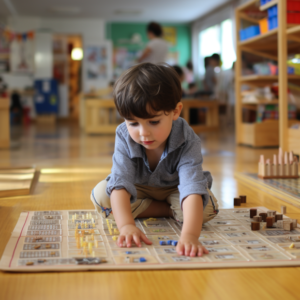In the enchanting world of Montessori education, the role of the educator transcends that of a traditional teacher. As a passionate teacher and school director, I embrace the profound responsibility of guiding young learners through their formative years. In this article, we will explore the unique and pivotal role of the Montessori educator in shaping the holistic development of a child.
- The Montessori Educator as a Facilitator of Learning
In the Montessori classroom, the educator is more of a facilitator, observing and responding to each child’s individual needs and interests. We foster a nurturing environment that encourages self-directed learning, sparking curiosity and igniting the flame of discovery in our young learners. - Nurturing Independence and Decision-Making Skills
Empowering children to make choices fosters a sense of independence and responsibility. Montessori educators gently guide children in making decisions, allowing them to learn from their experiences and develop critical decision-making skills from an early age. - Cultivating a Love for Learning
A key aspect of the Montessori approach is to instill a lifelong love for learning. By presenting engaging and meaningful learning materials, we cultivate a thirst for knowledge, encouraging children to explore and discover the world around them with joy and enthusiasm. - Individualized Learning Pathways
Every child is unique, and Montessori educators respect and celebrate these differences. By observing each child’s progress and interests, we tailor learning experiences to match their individual abilities, ensuring every child reaches their full potential. - Fostering Social and Emotional Development
In the Montessori classroom, social and emotional growth are equally important as academic achievements. Through daily interactions and collaborative activities, we help children build strong social skills, empathy, and a deep sense of community. - Creating a Prepared Environment
The Montessori classroom is intentionally designed to encourage exploration, independence, and concentration. As educators, we meticulously arrange learning materials and ensure a safe, organized, and aesthetically pleasing environment that stimulates creativity and curiosity. - Encouraging Lifelong Critical Thinking
Montessori educators foster critical thinking skills by posing thought-provoking questions and encouraging children to explore various solutions. This approach nurtures a habit of asking “why” and inspires a love for problem-solving. - Supporting the Development of Concentration and Focus
Through uninterrupted work periods, children in the Montessori environment develop exceptional concentration and focus. As educators, we gently guide them to stay engaged in tasks, fostering deep concentration and a sense of accomplishment.
In the captivating journey of Montessori education, the role of the educator is transformative. As a passionate teacher and dedicated school director, I firmly believe that the Montessori educator’s influence extends far beyond the classroom. By nurturing young minds with love, patience, and respect, we lay the foundation for a lifetime of learning and fulfillment. Together, let us continue to embrace the essence of Montessori and shape a brighter future for our children.

